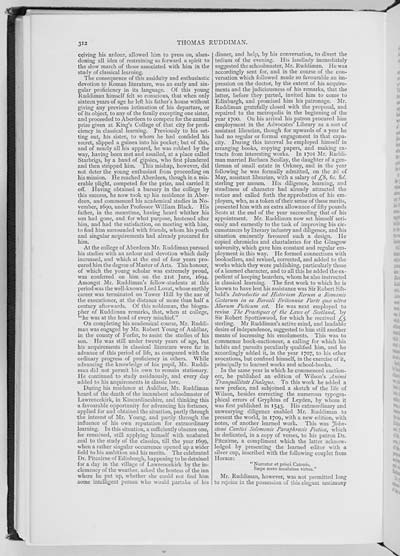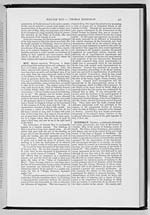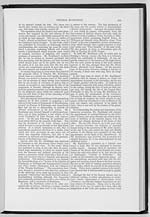312
ceiving his ardour, allowed him to press on, aban-
doning all idea of restraining so forward a spirit to
the slow march of those associated with him in the
study of classical learning.
The consequence of this assiduity and enthusiastic
devotion to Roman literature, was an early and sin-
gular proficiency in its language. Of this young
Ruddiman himself felt so conscious, that when only
sixteen years of age he left his father's house without
giving any previous intimation of his departure, or
of its object, to any of the family excepting one sister,
and proceeded to Aberdeen to compete for the annual
prize given at King's College of that city for profi-
ciency in classical learning. Previously to his set-
ting out, his sister, to whom he had confided his
secret, slipped a guinea into his pocket; but of this,
and of nearly all his apparel, he was robbed by the
way, having been met and assailed, at a place called
Starbrigs, by a band of gipsies, who first plundered
and then stripped him. This mishap, however, did
not deter the young enthusiast from proceeding on
his mission. He reached Aberdeen, though in a mis-
erable plight, competed for the prize, and carried it
off. Having obtained a bursary in the college by
this success, he now took up his residence in Aber-
deen, and commenced his academical studies in No-
vember, 1690, under Professor William Black. His
father, in the meantime, having heard whither his
son had gone, and for what purpose, hastened after
him, and had the satisfaction, on meeting with him,
to find him surrounded with friends, whom his youth
and singular acquirements had already procured for
him.
At the college of Aberdeen Mr. Ruddiman pursued
his studies with an ardour and devotion which daily
increased, and which at the end of four years pro-
cured him the degree of Master of Arts. This honour,
of which the young scholar was extremely proud,
was conferred on him on the 21st June, 1694.
Amongst Mr. Ruddiman's fellow-students at this
period was the well-known Lord Lovat, whose earthly
career was terminated on Tower Hill by the axe of
the executioner, at the distance of more than half a
century afterwards. Of this nobleman, the biogra-
pher of Ruddiman remarks, that, when at college,
"he was at the head of every mischief."
On completing his academical course, Mr. Ruddi-
man was engaged by Mr. Robert Young of Auldbar,
in the county of Forfar, to assist the studies of his
son. He was still under twenty years of age, but
his acquirements in classical literature were far in
advance of this period of life, as compared with the
ordinary progress of proficiency in others. While
advancing the knowledge of his pupil, Mr. Ruddi-
man did not permit his own to remain stationary.
He continued to study assiduously, and every day
added to his acquirements in classic lore.
During his residence at Auldbar, Mr. Ruddiman
heard of the death of the incumbent schoolmaster of
Lawrencekirk, in Kincardineshire, and thinking this
a favourable opportunity for advancing his fortunes,
applied for and obtained the situation, partly through
the interest of Mr. Young, and partly through the
influence of his own reputation for extraordinary
learning. In this situation, a sufficiently obscure one,
he remained, still applying himself with unabated
zeal to the study of the classics, till the year 1699,
when a rather singular occurrence opened up a wider
field to his ambition and his merits. The celebrated
Dr. Pitcairne of Edinburgh, happening to be detained
for a day in the village of Lawrencekirk by the in-
clemency of the weather, asked the hostess of the inn
where he put up, whether she could not find him
some intelligent person who would partake of his
dinner, and help, by his conversation, to divert the
tedium of the evening. His landlady immediately
suggested the schoolmaster, Mr. Ruddiman. He was
accordingly sent for, and in the course of the con-
versation which followed made so favourable an im-
pression on the doctor, by the extent of his acquire-
ments and the judiciousness of his remarks, that the
latter, before they parted, invited him to come to
Edinburgh, and promised him his patronage. Mr.
Ruddiman gratefully closed with the proposal, and
repaired to the metropolis in the beginning of the
year 1700. On his arrival his patron procured him
employment in the Advocates' Library as a sort of
assistant librarian, though for upwards of a year he
had no regular or formal engagement in that capa-
city. During this interval he employed himself in
arranging books, copying papers, and making ex-
tracts from interesting works. In 1701 Mr. Ruddi-
man married Barbara Scollay, the daughter of a gen-
tleman of small estate in Orkney, and in the year
following he was formally admitted, on the 2d of
May, assistant librarian, with a salary of �8, 6s. 8d.
sterling per annum. His diligence, learning, and
steadiness of character had already attracted the
notice and called forth the approbation of his em-
ployers, who, as a token of their sense of these merits,
presented him with an extra allowance of fifty pounds
Scots at the end of the year succeeding that of his
appointment. Mr. Ruddiman now set himself seri-
ously and earnestly to the task of improving his cir-
cumstances by literary industry and diligence, and his
situation eminently favoured such a design. He
copied chronicles and chartularies for the Glasgow
university, which gave him constant and regular em-
ployment in this way. He formed connections with
booksellers, and revised, corrected, and added to the
works which they were publishing, particularly those
of a learned character, and to all this he added the ex-
pedient of keeping boarders, whom he also instructed
in classical learning. The first work to which he is
known to have lent his assistance was Sir Robert Sib-
bald's Introductio ad Historiam Rerum a Romanis
Gestarum in ea Boreali Britannia Parte qua ultra
Murum Picticum est. He was next employed to
revise The Practiques of the Laws of Scotland, by
Sir Robert Spottiswood, for which he received �5
sterling. Mr Ruddiman's active mind, and laudable
desire of independence, suggested to him still another
means of increasing his emoluments. This was to
commence book-auctioneer, a calling for which his
habits and pursuits peculiarly qualified him, and he
accordingly added it, in the year 1707, to his other
avocations, but confined himself, in the exercise of it,
principally to learned works and school-books.
In the same year in which he commenced auction-
eer, he published an edition of Wilson's Animi
Tranquillitate Dialogus. To this work he added a
new preface, and subjoined a sketch of the life of
Wilson, besides correcting the numerous typogra-
phical errors of Gryphius of Leyden, by whom it
was first published in 1543. His extraordinary and
unwearying diligence enabled Mr. Ruddiman to
present the world, in 1709, with a new edition, with
notes, of another learned work. This was John-
stoni Cantici Solomonis Paraphrasis Poetica, which
he dedicated, in a copy of verses, to his patron Dr.
Pitcairne, a compliment which the latter acknow-
ledged by presenting the learned editor with a
silver cup, inscribed with the following couplet from
Horace:
"Narratur et prisci Catonis,
Saepe mero incaluisse virtus."
Mr. Ruddiman, however, was not permitted long
to rejoice in the possession of this elegant testimony

![]() Universal Viewer |
Universal Viewer | ![]() Mirador |
Large image | Transcription
Mirador |
Large image | Transcription
![]()

